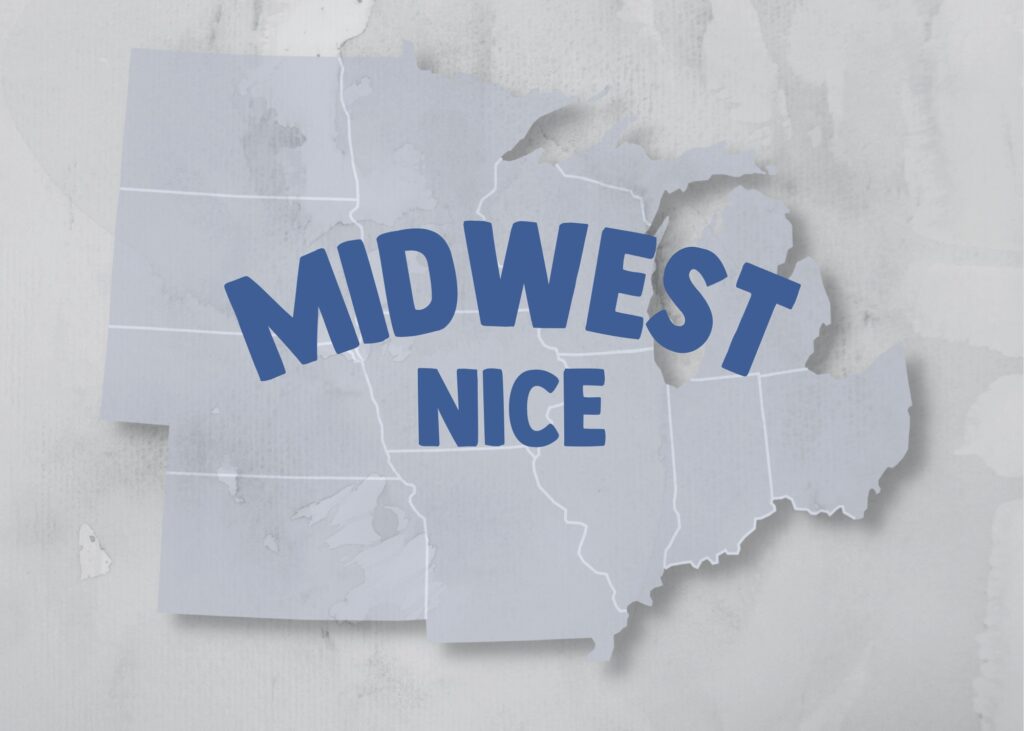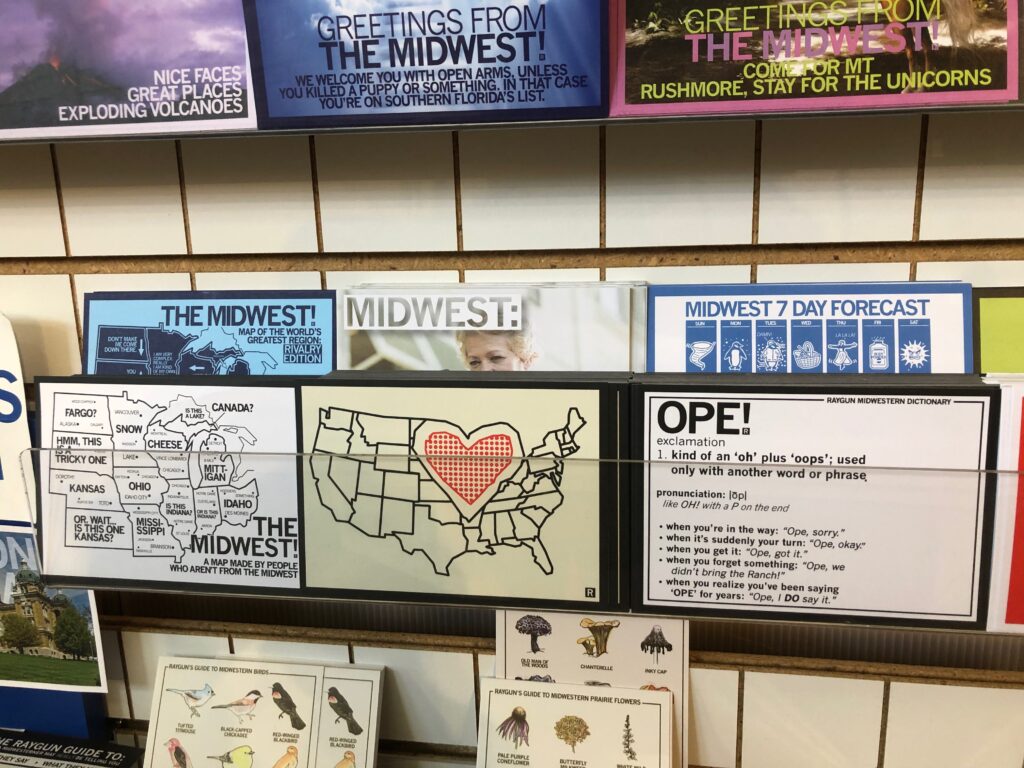
There is a place in the United States where it would be considered offensive not to wave at the stranger driving past you. For many, it may seem odd, but in the Midwest, it’s customary Midwest Nice. Midwest Nice is the cultural stereotype applied to the behavior of the people in the Midwest as they are known for being unusually polite, reserved, or passive-aggressive.
The Midwest includes many states, large cities, and rural communities. This makes Midwest Nice an ever changing standard. The experiences of Midwest Nice vary depending on where someone grew up and even where they moved to.
Follow a variety of different people’s experiences in the Midwest, including one store that has turned Midwest Nice into their own successful business.

RAYGUN
RAYGUN, also known as the “Greatest Store in the Universe”, originally began in Des Moines, Iowa, and has expanded to several locations in the Midwest, including Iowa City, Cedar Falls, Kansas City, Chicago, and Omaha. RAYGUN is known for its witty clothes and accessories.
The shop’s products play off Midwestern tendencies with different quotes commonly said by Midwesterners.
Kaitlynn Eide, store manager of the Des Moines shop, has had her fair share of experiences with Midwesterners. Eide has lived in Des Moines her whole life, making Midwest Nice tendencies the norm growing up.
“I’ve always heard it’s pretty different when you come to the Midwest,” Eide says.
Eide has continued to make profits off Midwest Nice trends and its political or job-related stereotypes.
“People in the Midwest are generally kinder people. Midwestern people go out of their way to make people feel good. We have the farmer’s wave, where you just wave next to everyone you drive by,” Eide says.
Students in the Midwest
Every year thousands of students decide to call the Midwest their home for the next four years. An international student, Antonio Pilivpovic, came to Des Moines from Germany to get his degree in Management. Pilivpovic was born and raised in Cologne, Germany, but his family is originally from Croatia. Pilivopic was raised by these two cultures, and now would have to learn another one.
His Midwest journey began in 2017 when he first traveled to Iowa for school. Pilipovic instantly noticed the culture in the Midwest when he moved, as he mentions everyone was overwhelmingly friendly.
“For me, it seemed like a strategy at first, but I have to say, after a couple of weeks in Des Moines, I got a feel of what people were referring to when talking about the Midwest Nice,” Pilivpovic says. “I even told my family over the phone how friendly, caring and welcoming the people around me were and how well-treated I felt by the community.”
Pilivpovic says the Midwest’s culture made his transition to the states much easier, something that may have been more difficult in other parts of the country. However, he also noticed the negatives that arise with the Midwest Nice mentality.
“But at the same time, I also questioned the authenticity of the Midwestern Nice, especially when it comes to avoiding an argument or confrontation,” Pilivpovic says. “It might make sense and feel better to just play something down but in the long-term it might cause more trouble than the initial confrontation that was avoided.”
The cultures of his hometown and college town were different, but overall Pilivpovic states he was glad to experience a new way of life over his four years.
“Beforehand, I was kind of nervous about how I would figure all these things out but I quickly realized a lot of people had the willingness to do everything in their power to help me make my arrival as smooth as possible,” Pilivpovic says. “In Germany, for example, I could not imagine this behavior at all. I lived here for the first 19 years of my life and I never felt this welcoming and caring feeling from people around me.”
Pilvipovic is currently living in his hometown in Croatia, but his four years in the Midwest has ultimately led to a part of him adapting a Midwestern mentality, even across seas.
“I really enjoy now interacting with people that I don’t know, on a level like we have known each other our whole life,” Pilvipovic says. “Being around the midwestern mentality will, in my opinion, lead people changing their natural personality and becoming more open and caring towards others.”
Moving to a new country comes with the assumption of culture shock, but even those moving within the United States notice a difference when entering the Midwest.
Terry Saul III, a senior at University of Iowa, moved to Iowa when he was 15. Born and raised in Mississippi, Saul noticed several differences between the regions, although the principles are similar.
“When I moved to the Midwest, there wasn’t that sense of community that there is in most southern towns and cities,” Saul says. “A lot of towns and groups of people in the Midwest display clique-like tendencies and aren’t as welcoming to people who are different from them.”
Saul also noticed social differences over his years living in the Midwest and the political implications that resulted from the Midwesterner mentality.

“I believe that the Midwest is less receptive to welcoming minority groups,” Saul says. “The Midwest, however does try to display itself as a more progressive region of the country, but you will only find that reality in metropolitan areas of the Midwest.”
Despite a less welcoming nature, Saul says that Midwest Nice attitude comes with a downside of letting the polintess go too far.
“When it comes to mannerisms differing from the south and east, people in the Midwest get walked over more because of the fact that they do not stand up for themselves,” Saul says. “Due to the fact of their over-willingness to compromise with something that they are not necessarily in favor for.”
Among the many places Saul has lived, he continues to fall back on his own personal values, rather than adapting to the tendencies of his location.
“I come from the philosophy that you should be nice to anyone, and if you have the ability to help someone then morally you ought to help them,” Saul says. “I believe that if everyone were to adopt this mindset it would drastically benefit the population as a whole.”
Leaving Midwest Nice
For those who grew up surrounded by cornfields, paying someone to mow your lawn in beer, and giving strangers directions, it can be a culture shock to leave.
Thomas Sommers was born and raised in southern Iowa and moved to San Clemente, California after graduating high school. Going from a town of 4,000 people to a West Coast city of 64,000 made the differences seem much bigger.
“Moving from Iowa to California, I still expected people to be nice the way they are back home, but that’s not the case,” Sommers says.
Sommers has now become used to the weird looks he gets when he waves at strangers walking by or asks to pet everybody’s dog. Realizing that they aren’t being rude, but that they just don’t understand the certain culture he grew up with, has been a huge help for him.
“People in California aren’t necessarily rude people in general, but they definitely aren’t Midwest Nice and I’d say I miss that a lot,” Sommers says.
Sommers has plans to move back to Iowa and looks forward to once again nodding his way down the aisles of Hy-Vee.
Generation to Generation
Anna Kline has lived in the Midwest for over sixty years. She grew up with both Midwest Nice and old school manners ingrained into her.
“When I was younger, it wasn’t just expected to be Midwest Nice. I was expected to have respect toward elders, be a lady and not to cause a fuss,” Kline says.
While Midwest Nice wouldn’t hold the expectation of keeping a calm and polite stance toward somebody who is disrespecting you, it hasn’t always been so forgiving.
“This notion was placed on me that I had to be kind. Even when people were being rude or strange toward me I believed it was my job to treat them kindly. Nowadays, young ladies know how to be kind but also when to put their foot down and demand respect,” Kline says.
However Midwest Nice has integrated into your life, it’s unique experiences connect us all. It is a cultural thing that displays the welcoming and friendly nature of the Midwest––evolving into a beautiful thing. Midwest Nice shows the importance of keeping a soft heart and recognizing the respect you deserve back.
